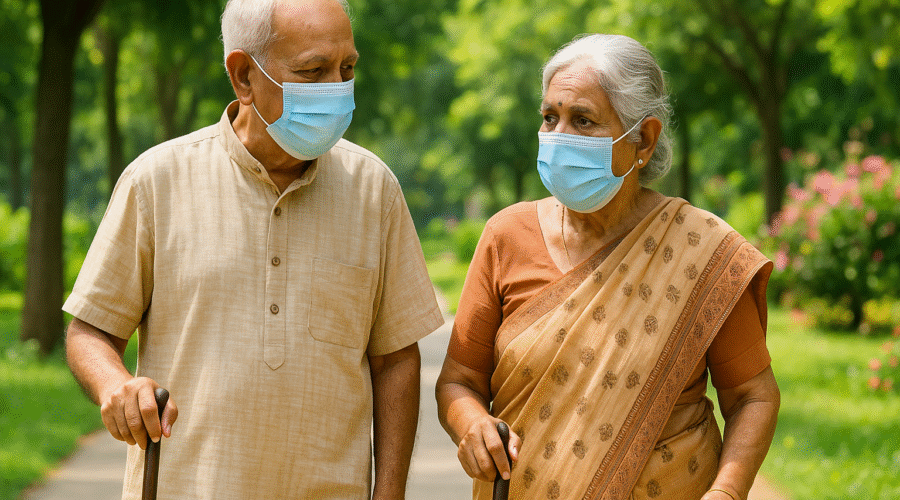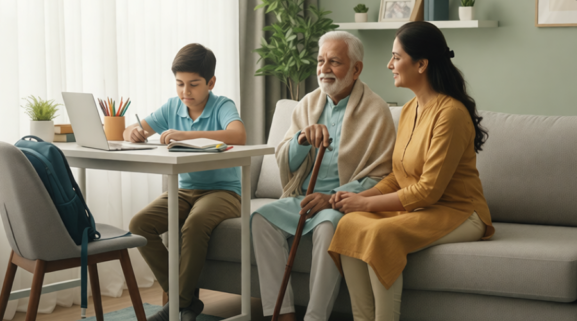The COVID‑19 pandemic transformed the way we think about health and caregiving—especially for seniors, who remain particularly vulnerable to respiratory illnesses and isolation. As we settle into 2025, here’s what families in India should know about keeping their elders safe, connected, and thriving in the “new normal.
1. Updated Precautions for Everyday Safety
1. Vaccination & Boosters
- COVID‑19 boosters tailored for the latest variants are now widely available. Ensure your loved one is up to date with the annual booster schedule recommended by India’s Ministry of Health.
- Keep other vaccinations current too—flu and pneumococcal shots protect against secondary infections.
2. Enhanced Hygiene Habits
- Continue frequent hand‑washing or sanitizing, especially after outings or before meals.
- Use medical‑grade masks (N95/KN95) when visiting crowded indoor spaces like markets or hospitals.
3. Air Quality & Ventilation
- Invest in a portable HEPA air purifier for high‑traffic rooms.
- Whenever possible, open windows for cross‑ventilation—especially during gatherings or family functions.
2. Embracing Hybrid Care Models
The pandemic accelerated the shift toward flexible caregiving that blends in‑person and virtual support.
In‑Home Care + Tele‑Visits
- Caregivers now routinely coordinate with physicians via video calls, sharing vital signs and medication updates in real-time.
- Periodic home‑visit nurses can perform blood tests or injections, reducing hospital trips.
“Day‑Care Plus” Centers
- Senior day‑care hubs now offer a mix of on‑site social activities and remote health check‑ins. Families drop off in the morning; a caregiver stays on‑call via app for afternoon tele‑consults.
Family‑Partnered Scheduling
- Mobile apps allow multiple relatives to block‑book care slots—whether it’s a physiotherapy session, meal‑prep help, or virtual doctor’s appointment.
3. Telehealth Trends & Tools
The pandemic accelerated the shift toward flexible caregiving that blends in‑person and virtual support.


Many Indian startups now offer Telugu, Hindi, and Tamil interfaces—making telehealth truly accessible across regions.
4. Mental & Emotional Well‑Being
Loneliness and “pandemic anxiety” still linger for many seniors. Proactive steps include:
Virtual Social Circles
- Regular “digital adda” via WhatsApp video or localized senior networks (e.g., Stray’s SilverCircle).
Mind‑Body Classes Online
- Yoga for seniors, guided meditation, and gentle chair exercise sessions are broadcast live in regional languages.
“Health Buddy” Check‑Ins
- AI‑powered voice calls that remind elders about medications, ask simple wellness questions, and alert family if answers deviate from set norms.
5. Planning for Future Outbreaks
There’s no guarantee another pandemic won’t arise. Forward‑looking families should:
1. Maintain a “Care Emergency Kit
- Includes masks, sanitizer, pulse oximeter, basic first‑aid, and a printed list of telehealth contacts.
2. Build a “Backup Care” Roster
- Identify 2–3 alternative caregivers or agencies in different neighbourhoods, in case primary support is unavailable.
3. Establish Clear “Tele‑Care” Protocols
- Document when to call an ambulance vs. a doctor vs. a caregiver—so everyone acts swiftly and calmly in a crisis.
Final Thoughts
Post‑COVID senior care in 2025 blends heightened safety standards, flexible hybrid models, and robust telehealth—all tailored to India’s diverse needs. By updating precautions, embracing new care technologies, and planning, families can ensure their elders live with health, dignity, and connection in this evolving landscape.
Looking for expert guidance on post‑COVID senior care?
Senior Care Joy connects you with verified caregivers, tech‑enabled support, and personalized care plans—so your loved ones stay safe, healthy, and happy, no matter what the future holds.



